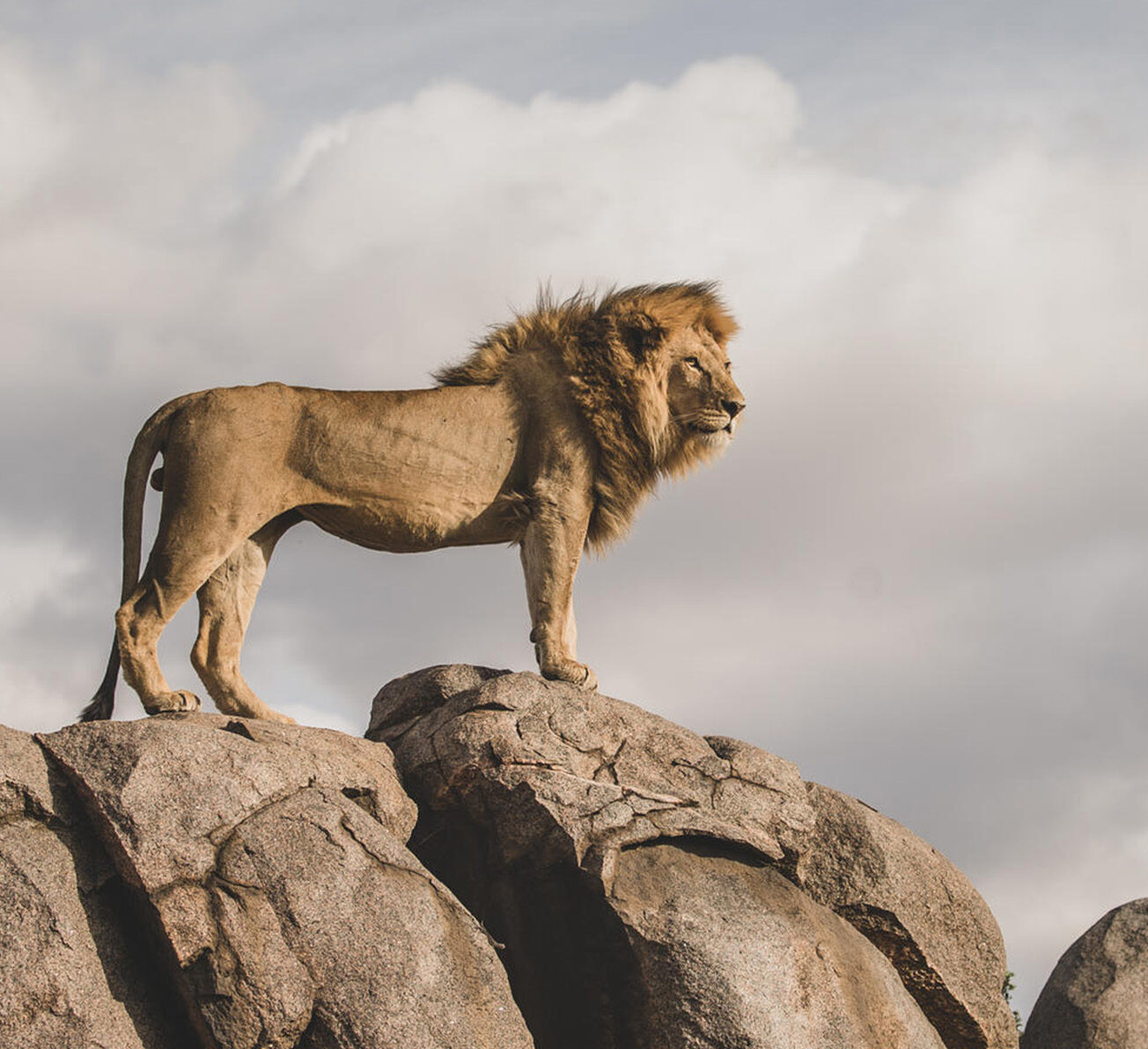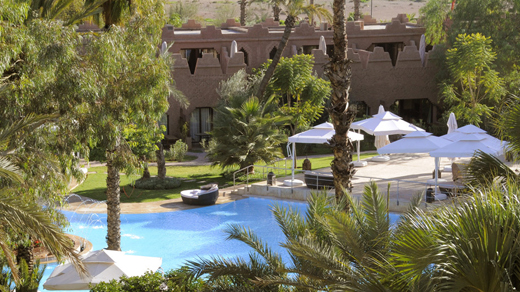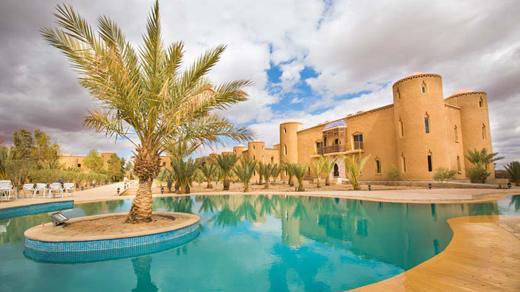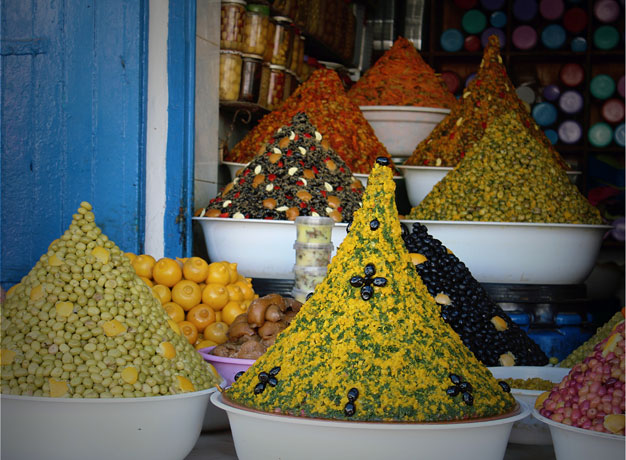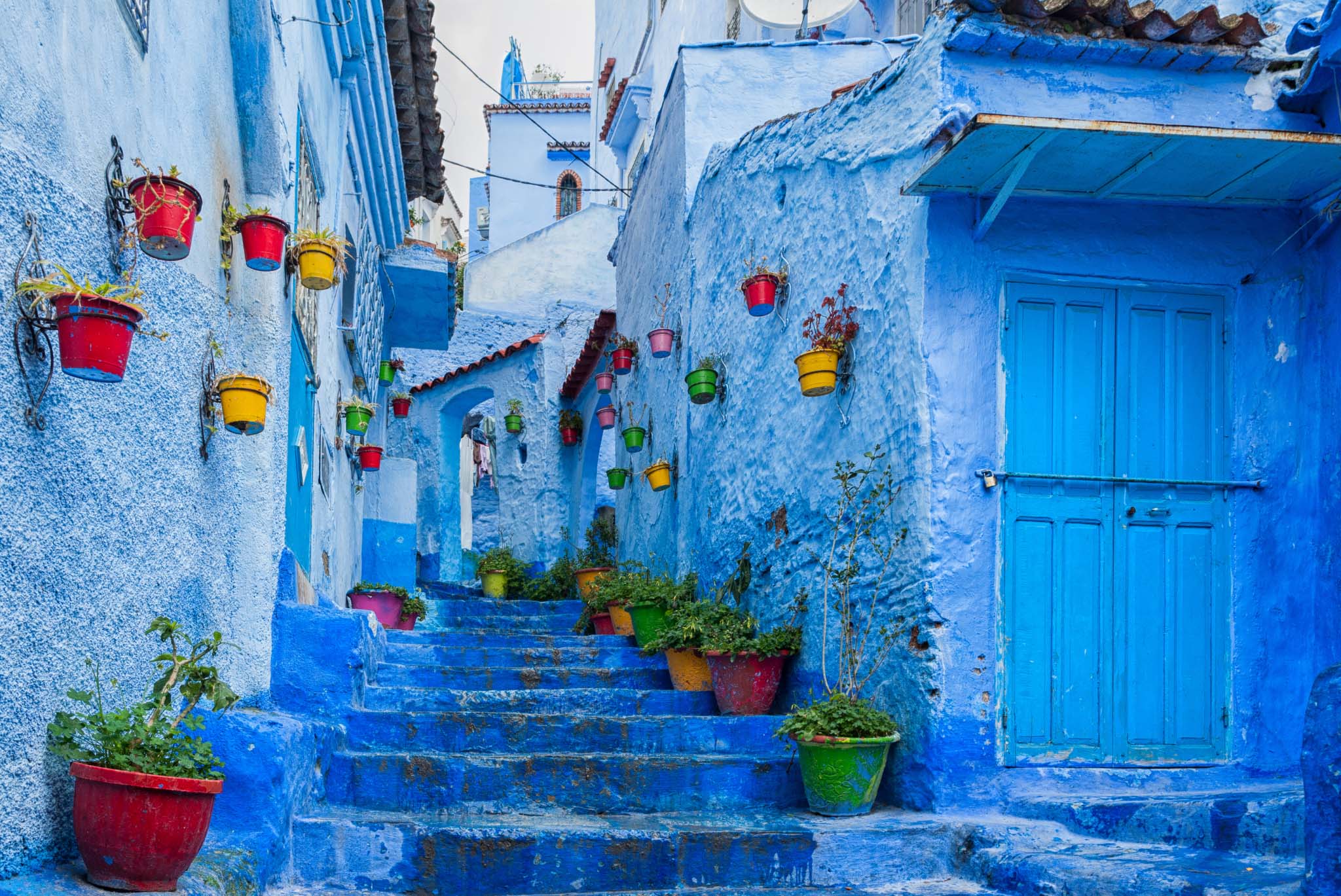
Morocco
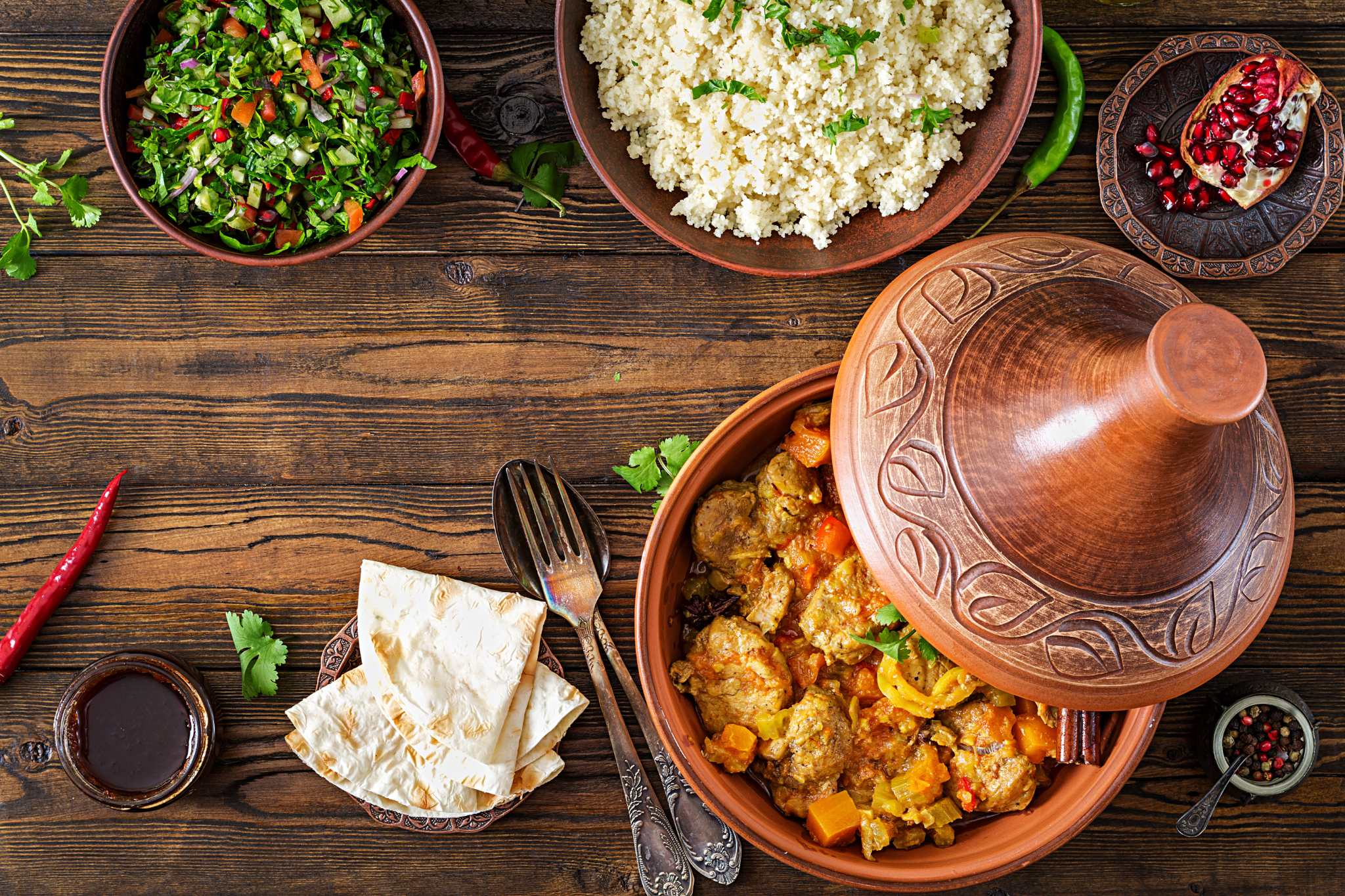
Morocco Tours and Holidays
Morocco is a place where culture, history and landscapes come together in vivid colour. From the buzzing souks of Marrakech to the blue-washed alleys of Chefchaouen, every corner tells a story shaped by African, Arab and European influences. The food here is as rich and varied as the culture itself. Fragrant tagines, fresh breads, sweet mint tea and bold spices fill the markets and tables alike. Whether you are drawn to ancient medinas, desert adventures or coastal towns, Morocco’s rich cultural tapestry and unforgettable flavours make it a compelling choice for travellers seeking something layered, authentic and deeply satisfying.
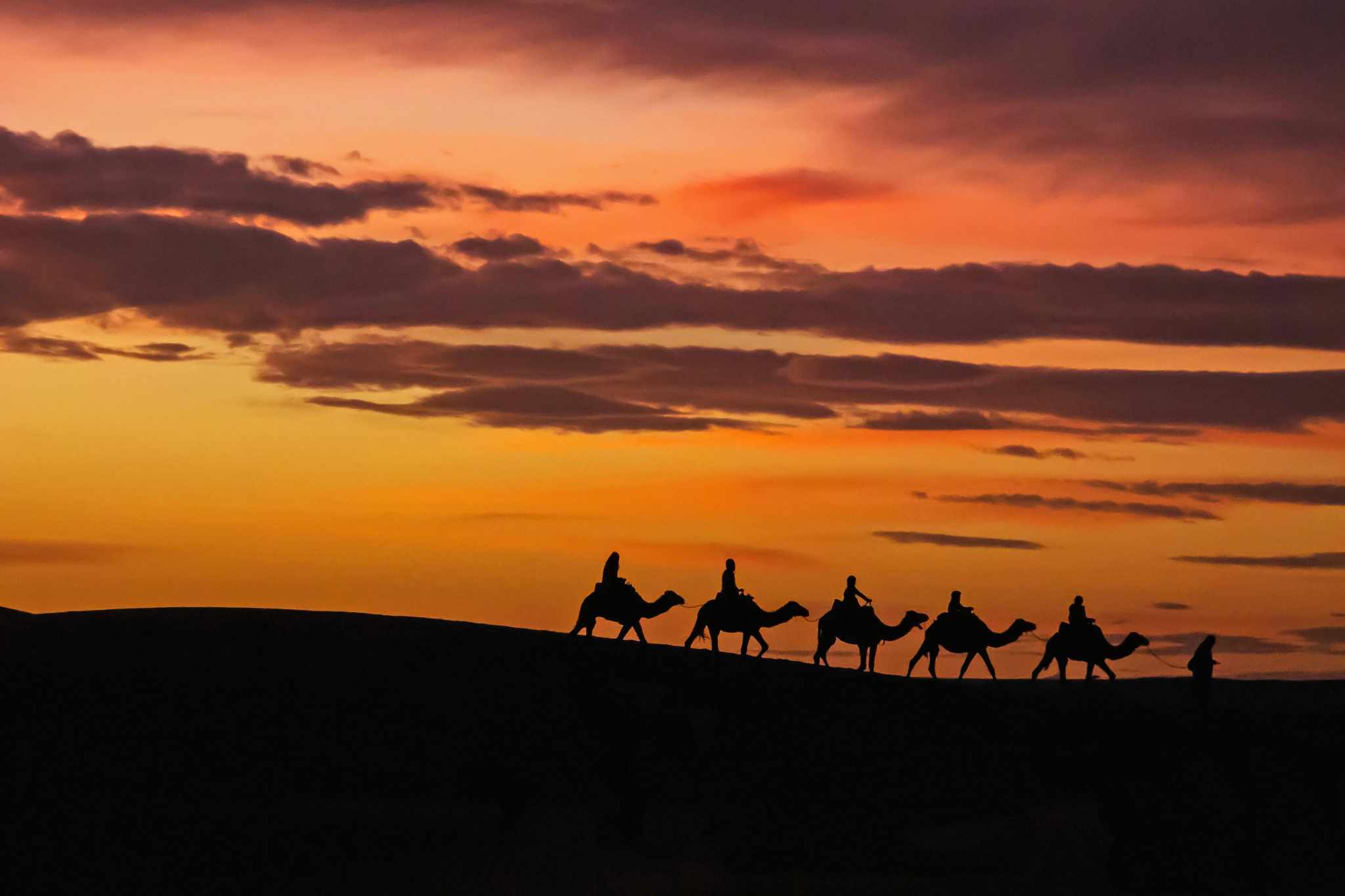
What to expect when travelling in Morocco:
Begin on the coast in Tangier, long a gateway between Europe and Africa, then follow the Atlantic down to Casablanca, known for its cinematic fame and modern edge. Continue to the coastal towns of Asilah and Essaouira, where whitewashed walls and sea air slow the pace.
Inland, the imperial cities of Marrakesh and Fez draw travellers with their layered histories and maze-like medinas. These ancient quarters are alive with craftsmanship, tradition and everyday theatre, each turn revealing something unexpected.
Beyond the cities, Roman ruins and dramatic valleys mark the landscape. The High Atlas Mountains stretch across the country’s spine, ideal for walkers keen to trace Berber paths through timeless villages or to summit Jebel Toubkal, North Africa’s highest peak. For a different rhythm, head for the Sahara. Ride by camel across golden dunes and sleep under a sky so clear it barely seems real.
Stay in restored riads, desert camps and remote lodges. Throughout, expect genuine Maghreb hospitality, welcoming and deeply rooted in place.
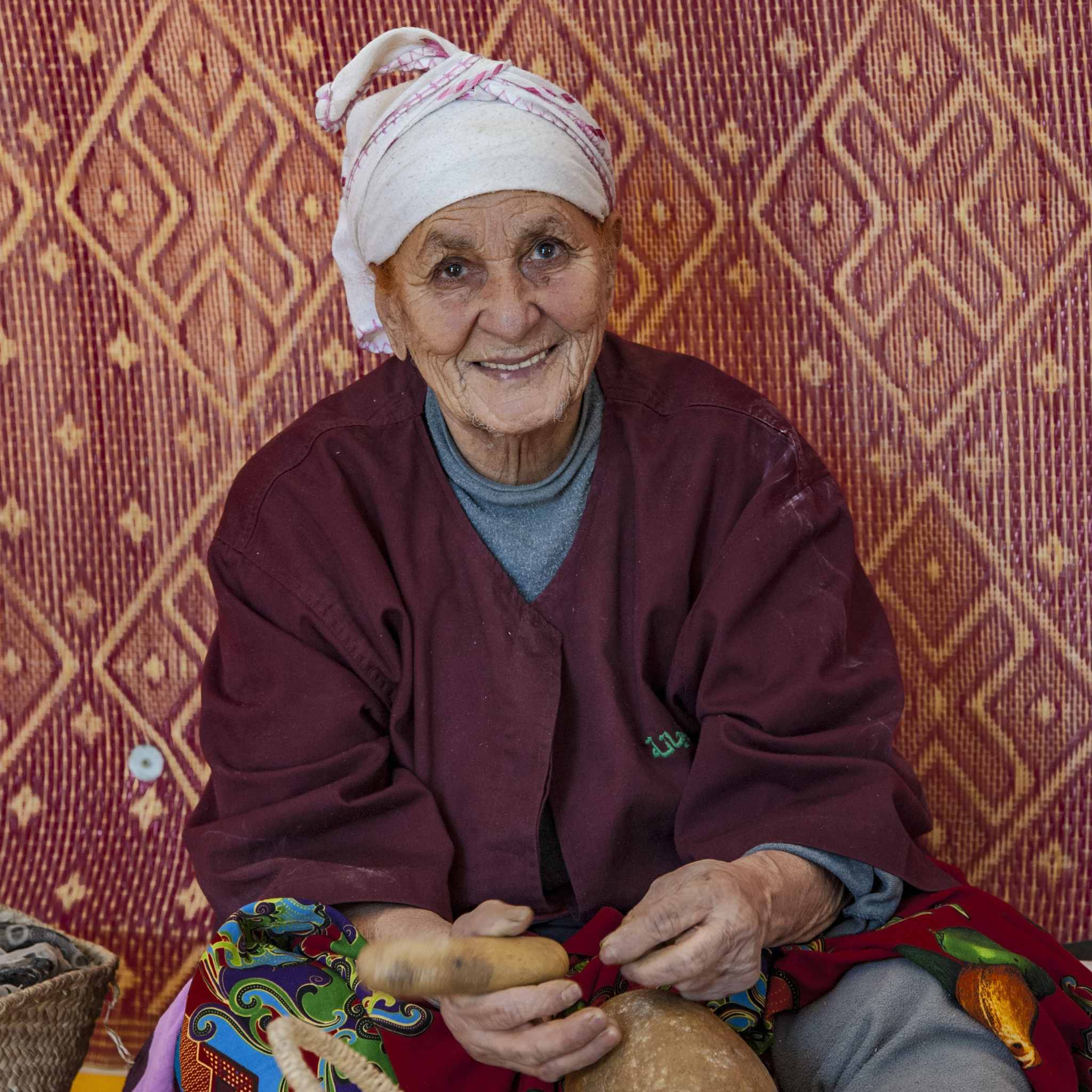
- Full Country Name The Kingdom of Morocco
- Area 446,550 km
- Population 34.6 million (UN 2015)
- Capital Rabat
- Borders Algeria is closed and Mauritania is open but has no public transport
- Religion Majority Islam
- Time Zone Standard time is one hour in advance of Greenwich Mean Time
- Languages Arabic (official), Berber, French and Spanish
- Country Dialling Code +212
Morocco highlights
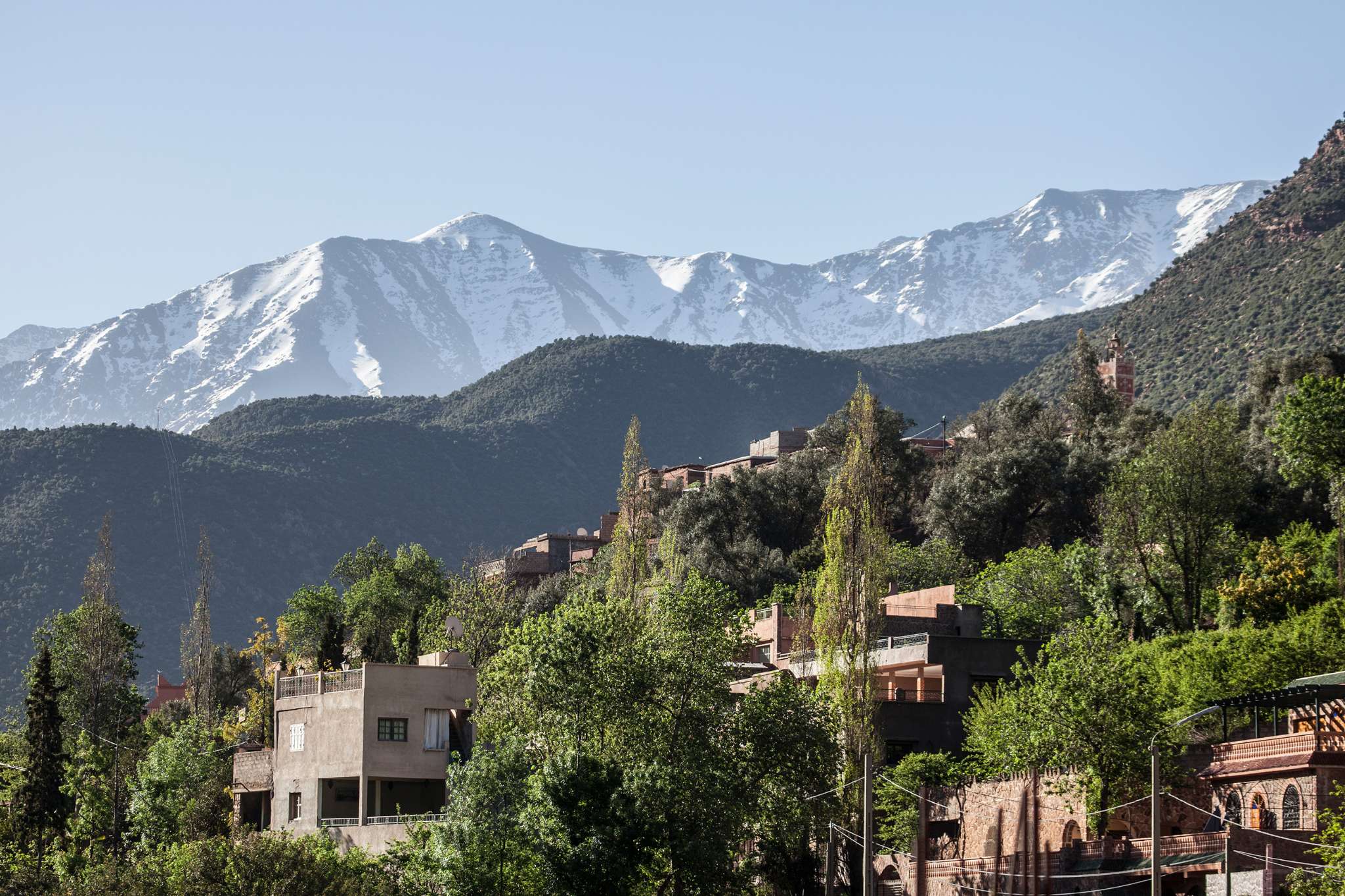
Atlas Mountains
The High Atlas Mountains bring a dramatic shift in scenery—red earth, terraced valleys, and snow-dusted peaks. Berber villages cling to the hillsides and local markets spill into mountain roads. Travellers often stop here en route to or from the Sahara or Marrakech, gaining a glimpse of rural Morocco.
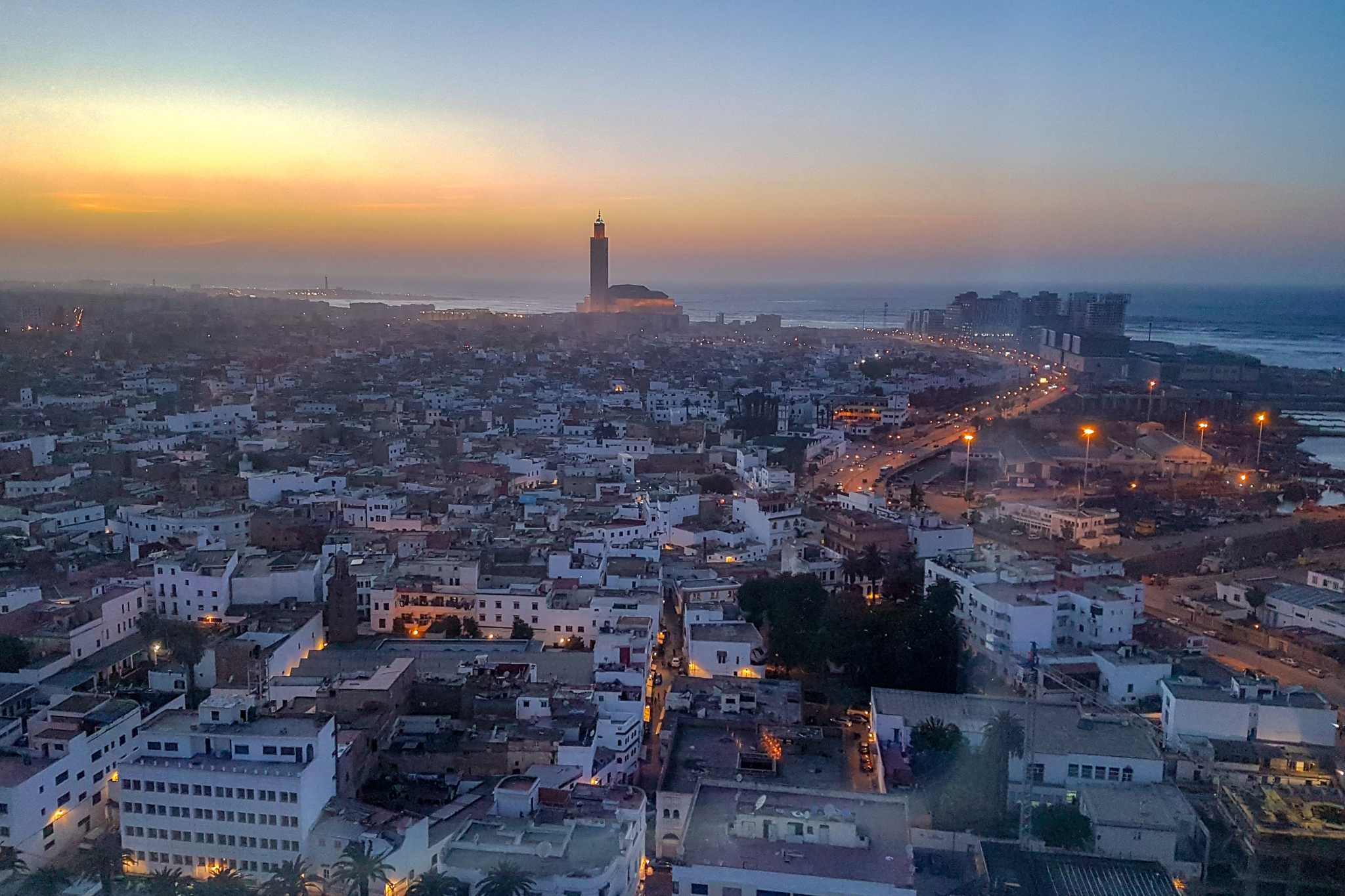
Casablanca
Morocco’s largest city, the commercial and industrial capital, cosmopolitan Casablanca is ideally situated for exploring the surrounding countryside and the attractive coastline.
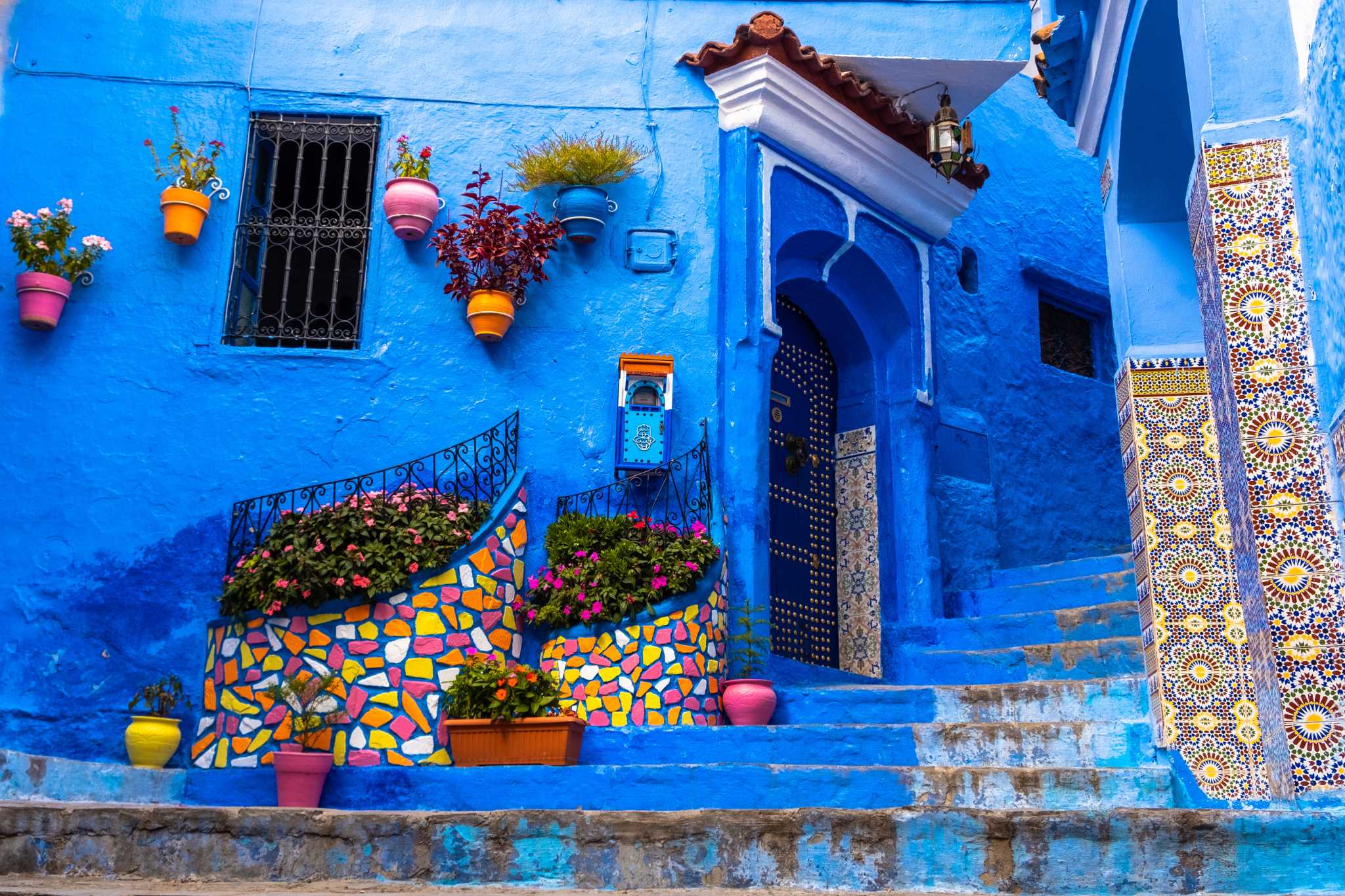
Chefchaouen
Tucked into the Rif Mountains, Chefchaouen is known for its striking blue buildings. Walls, steps and doorways are all painted in soft shades that shift with the light. The pace is slower here than in the big cities. It’s a place to wander the narrow lanes, browse handmade crafts and take in the cool mountain air.
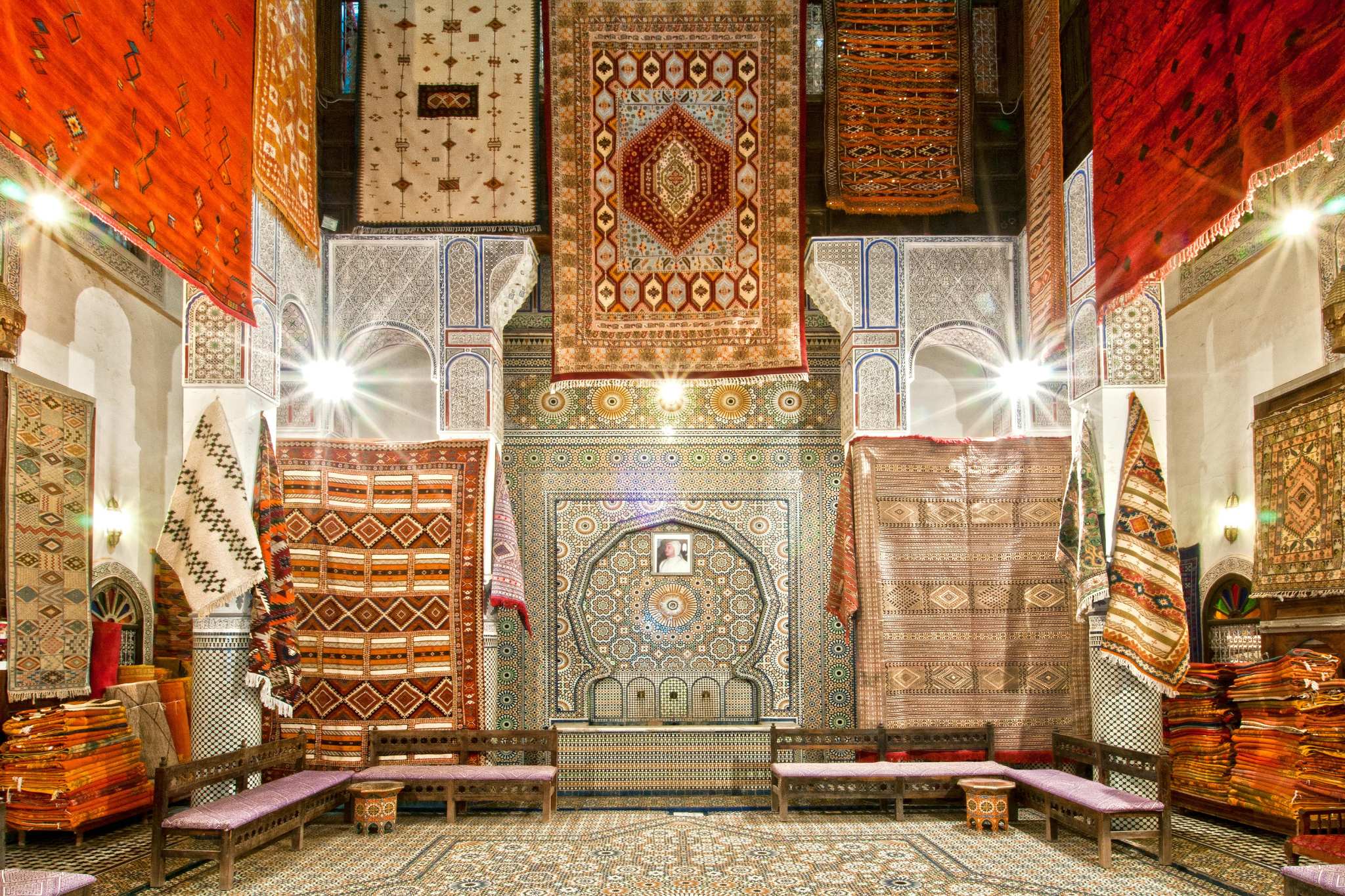
Fès
Often described as Morocco’s cultural capital, Fès draws travellers into its maze-like medina, where ancient craft traditions still thrive. The city’s heritage is deeply layered—step through the gates and you’ll find tanneries, centuries-old libraries, and tiled courtyards behind carved wooden doors.
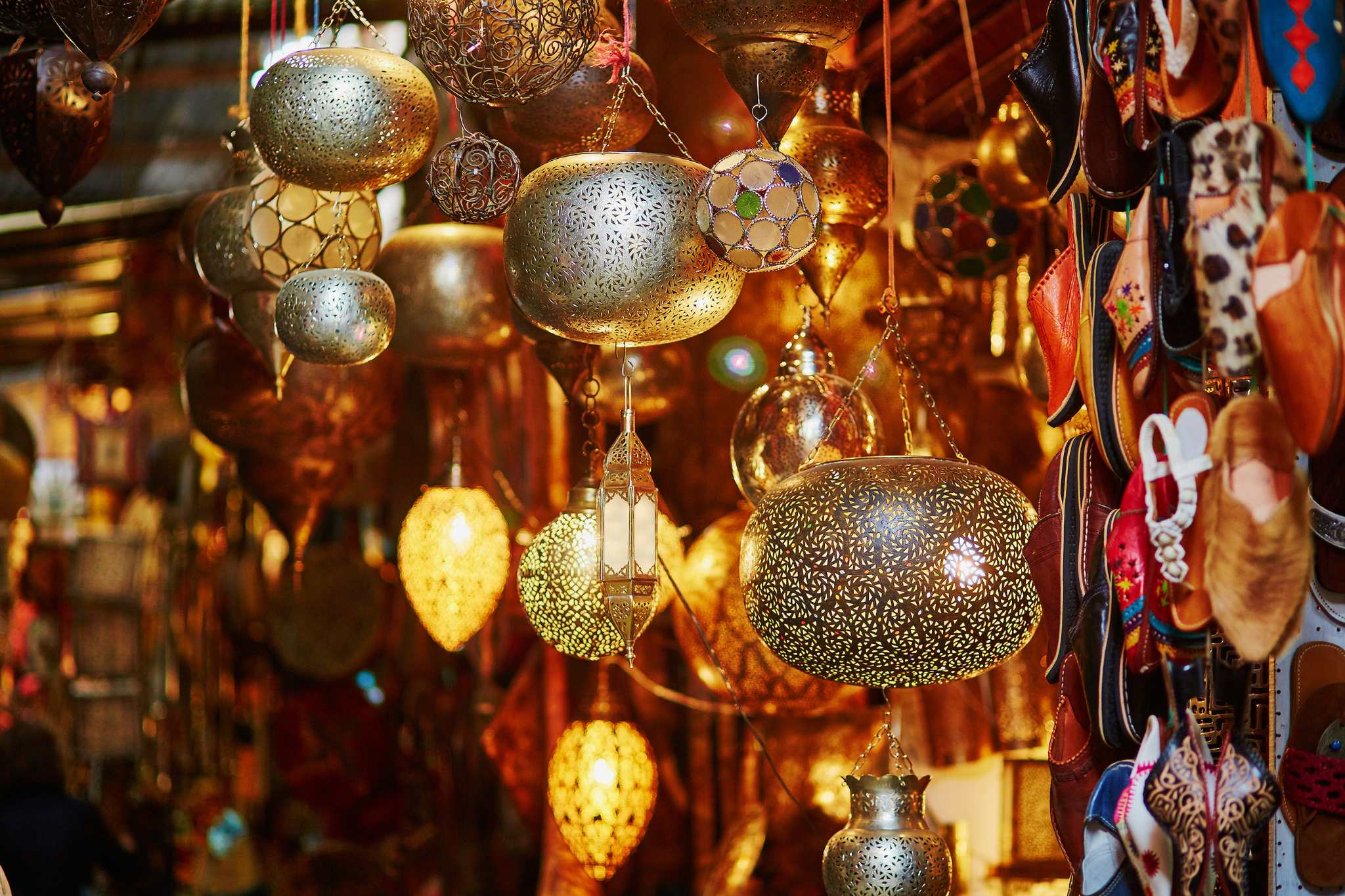
Marrakech
Marrakech moves at its own pace. In the medina, narrow alleyways twist between souks piled high with spices, leather, and lanterns. The call to prayer floats over rooftops, and the scent of grilled meat drifts from food stalls in Jemaa el-Fnaa. Behind unmarked doors, calm riads with tiled courtyards offer a quiet pause.
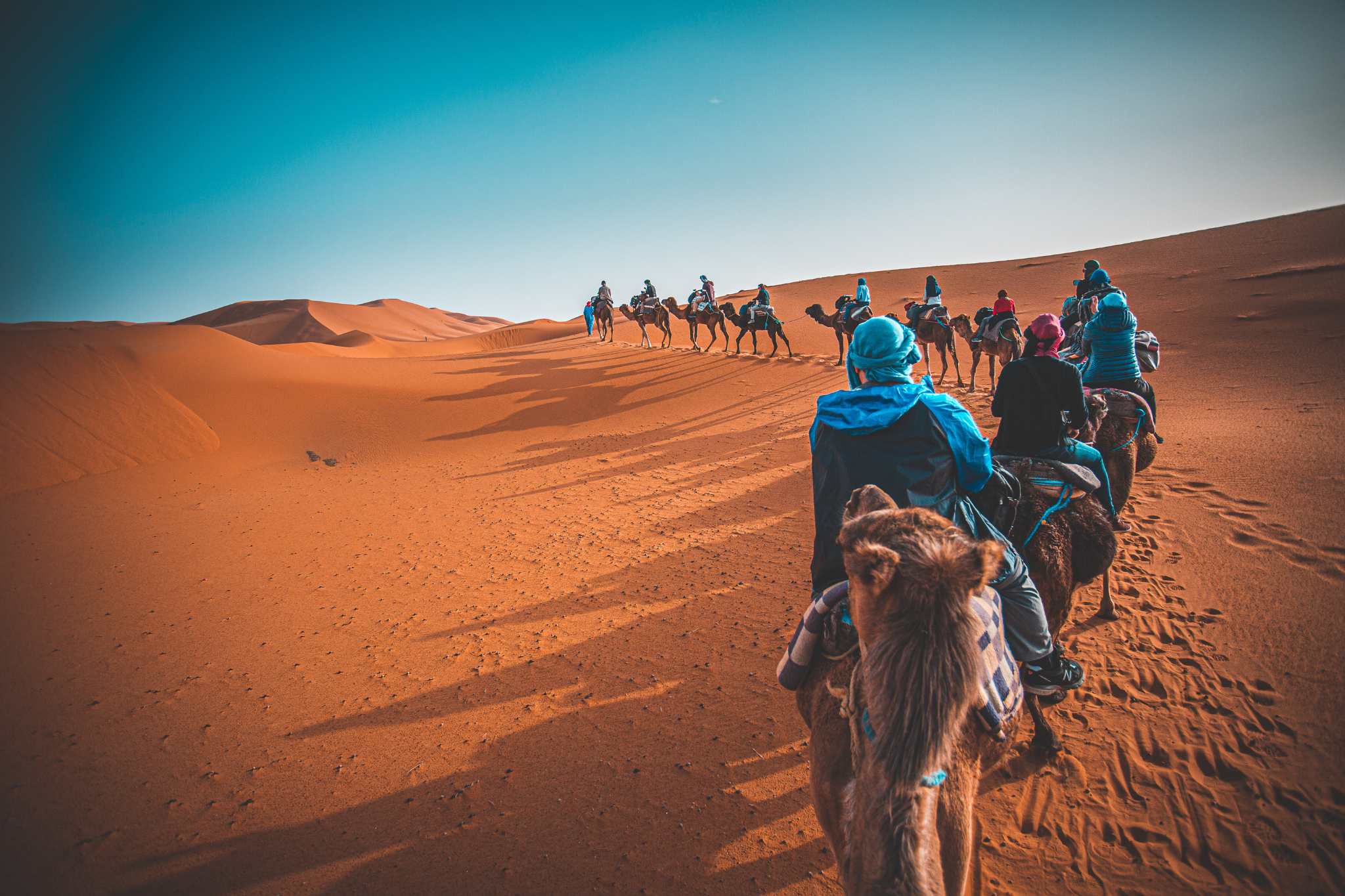
Sahara Desert
At the edge of the Sahara, the dunes of Erg Chebbi rise from the earth like waves. Here, you can ride camels to remote desert camps, sleep under the stars, and meet the nomadic communities that still call this landscape home.
Morocco experiences
Essential trip information
-
Accommodation
-
Accommodations in Morocco range from good tourist-standard hotels to award-winning deluxe properties. You may consider staying in a riad, which is a traditional Moroccan house or palace built around a central courtyard or garden. Riads often feature a fountain, open-air spaces, and rooms arranged around the courtyard, offering privacy from the busy streets outside. Many have been converted into boutique guesthouses, combining traditional Moroccan design such as intricate tile work, carved wood, and plasterwork with modern comforts.
Very occasionally, circumstances beyond Bench Africa’s control may necessitate a change in your accommodation, and advance notice will be provided where possible.
-
Clothing
-
General Information
For Morocco, formal attire is generally not required, though you may wish to bring smarter clothing for dining in high-end city hotels or attending cultural events. Lightweight, breathable clothing is ideal for the warm days, while long sleeves, trousers, or skirts can help provide modesty in accordance with local customs, particularly when visiting religious or rural sites. A sun hat, sunglasses, and sunscreen are recommended, as the sun can be strong in desert and coastal areas. Evenings in the desert or mountainous regions can be cool, so a warm layer or light jacket is useful. Comfortable walking shoes are essential for exploring medinas, souks, and archaeological sites, and sandals or trainers are suitable for city strolls. Many riads and hotels offer laundry services, but if your itinerary is full, it is wise to confirm timing to ensure your clothes are ready when needed.
Packing List
Essentials
- Soft-sided bag or suitcase for ease of storage
- Hat for sun protection
- Reusable water bottle
- Good quality, preferably polarized sunglasses
- Camera, charger, and travel adaptor
- Travel adaptor for charging devices
- Spare glasses or contact lenses
- Comfortable walking shoes, trainers, and sandals
- Lightweight clothing for warm days
- Long trousers, skirts, or dresses for modesty, especially at religious sites
- T-shirts and long-sleeved shirts for cooler evenings
- Light sweater or jacket for desert or mountain regions
- Scarf or shawl for sun protection or visiting religious sites
- Swimming costume
Health and Safety
- Basic medical kit (aspirins, bandages, Imodium, antiseptic cream, etc.)
- Prescription medications if needed
- Insect repellent, particularly in rural or oasis areas
- Protective suntan lotion, especially for pale or sensitive skin
-
Communication
-
Morocco has a reliable mobile and internet network, particularly in cities, towns, and popular tourist areas. International calls can be made from hotels, though many travellers find it more cost-effective to use mobile apps over Wi-Fi. If your phone supports international roaming, you can connect to local networks, but charges may be high. Purchasing a local SIM card or activating an eSIM is often the most convenient option, with providers such as Maroc Telecom, Orange, and Inwi available at airports and in major towns.
Wi-Fi is widely available in hotels, riads, cafés, and restaurants, although speeds may vary, and service can be less reliable in rural regions, the desert, and mountain areas. Coverage is generally good along the main travel routes, but travellers should expect occasional weak reception in remote locations.
-
Country Overview
-
Morocco, a land where ancient traditions meet modern vibrancy, captivates visitors with its diverse landscapes, rich history, and vibrant culture. Nestled in North Africa, this enchanting destination offers a plethora of experiences blending old-world charm with contemporary allure.
Marrakech, with its bustling souks, ornate palaces, and the vibrant Jemaa el-Fnaa square, embodies the city’s vibrant spirit. The intricate architecture of the medina, adorned with colourful tiles and intricate carvings, reflects the country’s historical and artistic heritage. The Sahara Desert, an expanse of golden dunes, invites travellers to embark on camel treks and experience the magic of starlit nights in traditional Berber camps. The Atlas Mountains provide a dramatic backdrop, offering trekking opportunities amidst picturesque valleys and traditional villages. Morocco’s coastal cities, including Casablanca and Essaouira, offer a blend of seaside charm, historic landmarks, and a lively arts scene. The blue-washed streets of Chefchaouen, tucked in the Rif Mountains, create a serene ambiance that contrasts with the vibrancy of the marketplaces.
The rich tapestry of Moroccan cuisine, with its aromatic spices and flavourful dishes, adds a gastronomic dimension to the travel experience. The time-honoured tea ceremonies and the lively atmosphere of traditional festivals showcase the warmth of Moroccan hospitality.
-
Customs & Beliefs
-
Morocco is primarily a Muslim country, and it is important for visitors to observe and respect religious customs, especially regarding clothing and public behaviour. Kindly be reminded to dress modestly by covering your shoulders to below the knee. It is expected that women adhere to a more conservative dress code than men. Additionally, gentlemen are advised not to wear short shorts and tight singlets.
During the holy month of Ramadan, it is crucial to refrain from eating, drinking, and smoking in public, as it goes against Muslim cultural norms. Alcohol can only be purchased at licensed hotels and restaurants.
-
Electricity
-
Voltage & Frequency
The general voltage in Morocco is 220 and the frequency is 50 Hz.
Socket Types in Morocco
Type C
Type E -
Families
-
Morocco is a very welcoming destination for families with children. The lively souks, colourful traditions, and wide open desert landscapes capture the imagination of both big and little kids, creating experiences that feel adventurous yet accessible. From camel rides in the Sahara to wandering the narrow streets of ancient medinas, the country offers plenty of variety to keep children engaged.
Accommodation for families varies widely. Many hotels and riads welcome children, and some larger resorts by the coast or in Marrakech provide swimming pools, interconnecting rooms, and family suites. However, not all riads or traditional properties are suitable, as they may have steep stairs, inner courtyards with little child-proofing, or limited space for extra beds. For this reason, it is important to select properties carefully to match the age and needs of your children.
Families often enjoy splitting their stay between more traditional riads in the cities for cultural immersion and resorts or lodges where there is more space to relax.
Speaking with a specialist here at Bench helps ensure you choose accommodation that balances authentic Moroccan charm with practical considerations for families.
-
Health
-
We recommend that you speak to your GP or a specialist Travel Doctor for the most up-to-date health advice, as recommendations can change depending on the season, region, and length of your trip. They will be able to advise you on any necessary vaccinations, malaria precautions where relevant, and general travel health tips.
It is also wise to carry a basic medical kit and any prescription medication you may need, as pharmacies in Morocco may not always stock the same brands or dosages you are used to at home.
-
Insurance
-
Our Tips for Choosing Insurance
Insurance is a mandatory requirement for your travels, and we strongly advise you to secure Comprehensive Travel Insurance at the time of booking your trip.
Make sure you have a thorough understanding of the Terms and Conditions outlined in your policy and that you are well informed about your insurance coverage to ensure that you are adequately prepared for any unforeseen circumstances during your travels.
-
Money Matters
-
Currency
The unit of currency in Morocco is the Dirham (DH).
You Should Know
Full banking services are available in all the main cities and towns, although a commission is normally charged, and it is advisable to only use commercial banks and licensed exchange bureaus. Australian credit cards are commonly accepted in larger cities and tourist hubs. Additionally, ATMs are prevalent in cities and most large towns.
The Moroccan Government-approved exchange currencies list does not include the Australian Dollar. Therefore, you won’t be able to exchange Australian dollar cash while in Morocco. It’s recommended to convert Australian dollars into US dollars or euros before your arrival, as these are accepted by Moroccan exchange bureaus.
Note that it’s illegal to take Moroccan Dirhams out of the country. Convert any remaining Dirhams before departing Morocco.
Credit cards are not accepted everywhere, so it is not advisable to rely solely on credit cards as a primary source of funds, particularly in places where card usage may be limited, such as remote lodges. It is recommended to inform your bank before using your credit card overseas, and using a PIN number is considered more secure than a signature. In Africa, Visa is the most widely accepted credit card, with larger establishments also accepting American Express and MasterCard. Diners Club is not generally accepted in most establishments.
-
Recommended Reading
-
- Amazir: A Noel of Morocco by Tom Gamble
- The Caliph’s House: A Year in Casablanca by Tahir Shah
- The House in Morocco by Rosalind Brackenbury
- The Road to Fez by Ruth Knafo Settonx
- Berber Odes: Poetry from the Mountains of Morocco by Michael Peyron
- Travels with a Tangerine by Tim Makintosh-Smith
-
Responsible Giving
-
As you prepare for your journey to Africa, consider making a positive impact on local communities by allocating a small space in your luggage for essential items that can significantly improve the lives of those in need.
Explore the Pack for a Purpose initiative, connecting travellers with specific requirements identified by local projects. The website provides a platform where you can find a list of requested items and guidelines for responsible giving.
Additionally, many camps actively engage in community projects, often sharing details on their websites. Take a moment to visit the websites of the camps you’ll be staying at. Check if they have specific needs for supplies that you can bring and donate upon your arrival. A small act of generosity can make a significant difference.
-
Road Travel
-
Road Conditions
Please note that road surfaces vary from tarmac, gravel, sand and occasionally vehicles may travel “off road”. Additionally, when exploring remote areas, National Parks, and Reserves, expect rough and bumpy roads, occasionally in poor condition and susceptible to adverse weather conditions.
-
Safety and Security
-
General Safety
- Doors should be locked when driving after dark.
- Don’t walk alone at night in city streets, isolated beaches or remote areas.
- Travellers should not display unnecessary signs of wealth (e.g. mobile phones, money, and expensive jewellery) on the streets.
- Leave all your valuables including passports locked in the room safe where available.
Safety on Safari
When staying at safari camps and lodges, they will often give you a safety briefing and there are several key points to keep in mind regarding wildlife respect and safety:
- Wild animals in Africa are not like those found in theme parks; they are not tame.
- Camps are often unfenced, allowing wild animals to roam freely. While attacks are extremely rare, it is crucial to strictly follow camp guidelines to ensure your safety.
- Pay close attention to the camp staff and guides.
- Avoid wandering off on your own without a guide, even within the camp. Once you retire to your room at night, it is important that you do not leave.
- Observe animals silently, minimising disturbance to their natural activities. Loud talking on game drives can frighten the animals away.
- Never attempt to attract an animal’s attention. Avoid imitating animal sounds, clapping your hands, pounding the vehicle, or throwing objects.
- Respect your driver/guide’s judgement regarding proximity to lions, cheetahs, and leopards. Avoid insisting on getting the vehicle closer for a better photograph, as it can disrupt a hunt or cause animals to abandon a hard-earned meal.
- Dispose of litter properly, as litter on the ground can harm or poison animals and birds.
- Never attempt to feed or approach any wild animal on foot, particularly near lodges or in campsites where animals may have become accustomed to human visitors.
- Refrain from smoking on game drives, as the dry African bush is highly flammable, and a flash fire can pose a threat to animals and their habitat.
-
Shopping
-
Morocco is full of vibrant markets and artisan workshops where you can find an array of beautiful souvenirs and crafts. Look for handwoven rugs, intricate ceramics, leather goods, traditional clothing, brassware, jewelry, and colorful textiles. Candles, argan oil, and spices also make popular gifts. Bargaining is a common and expected practice in souks and roadside stalls, though fixed prices are more common in established shops. Sellers may initially quote higher “tourist prices,” so polite negotiation is part of the experience.
Cash in Moroccan Dirhams is widely accepted, while US Dollars and Euros can sometimes be used in larger tourist areas. Credit cards are generally accepted in bigger shops, hotels, and restaurants, but cash is essential in smaller towns and markets.
We recommend choosing ethically made and locally sourced items to support traditional crafts and communities.
-
Tipping
-
Tipping Guidelines
Tipping is customary in Morocco, though not as widespread as in the United States or Europe. It is discretionary, a way of expressing gratitude for exceptional service.
To assist with budgeting, the following guidelines are provided in US Dollars:
Driver (per person per full day): $5.00
Guide (per person per full day): $10.00
Camp Staff (per person per full day): $5.00
Hotel porters (per bag): $1.00
Restaurant (per person per meal): $1.00
A la carte dining (percentage of bill): 10% -
Useful Numbers
-
Embassy of the Kingdom of Morocco
9 Terrigal Crescent, O’Malley ACT, Australia
+61-(02) 6290 0755Australian Embassy, Morocco
66, Avenue MehdiBen Barka
10000 Souissi-Rabat
Morocco
Phone: +212 537 543366 -
Visa Information
-
Do I Need a Visa to Travel to Morocco?
We do not provide advice on specific visas as regulations are subject to change and can vary from person to person. Please refer to Smart Traveller for the most up-to-date information. We advise checking visa requirements at the time of booking and again before travelling to keep abreast of any changes that may have occurred.
Visa requirements vary between countries, and it is essential that you acquire the appropriate visa for your journey and ascertain whether it can be applied for in advance or on arrival, in which case you will need the exact physical money. Often, your passport must be valid for at least six months beyond your intended stay, with a minimum of two blank pages (a double page). You will be required to have onward travel documents and sufficient funds. It is advisable to carry photocopies of all important documents.
It is your personal responsibility to confirm that your passport is valid, contains the necessary visa, and that you have all required travel documents.
You Should Know
- Visitors must also be in possession of onward travel documents and have sufficient funds for the duration of their stay.
- You must hold return or onward flight tickets.
- It is important to have two blank pages side by side in your passport for the entry and exit stamps to be issued. If there is insufficient space, entry into the country may be denied.
Please double check entry requirements on Smart Traveller as this may change at any time.
-
When to Travel
-
Climate
Morocco is at its best in spring (mid-March to May), when the country is lush and green. Autumn (September to November) is also a delightful time to visit, with the summer heat subsiding. Travelers venturing in winter should consider heading south, though they should anticipate chilly nights. The northern coast and Rif Mountains often experience wet and cloudy conditions during winter and early spring.
Spring: March - May
This is when Morocco is at its best. The country is lush and green and the weather is comfortable.
Summer: May – September
- Strictly speaking Morocco is hot and sunny for the best part of the year but in the summer temperatures soar and it can become uncomfortable.
- We would advise avoiding the desert areas between late May and early September.
Autumn: September - November
- At this time of the year the heat of summer has eased and it is a very pleasant climate.
Winter: November – February
- If you are travelling in winter, head for the south, although be prepared for cold nights.
- The north coast and the Rif Mountains are frequently wet and cloudy in winter and early spring.
Bench Africa on Instagram
